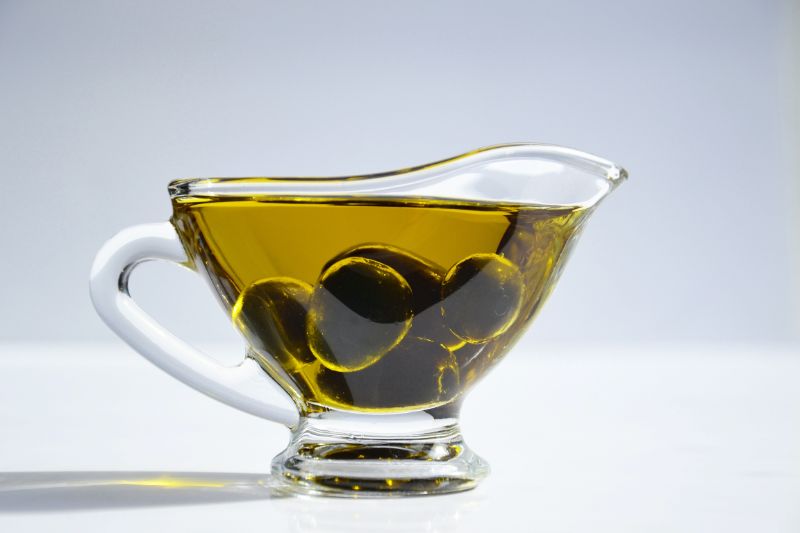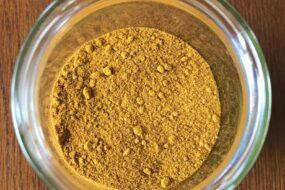
If you’re looking for a natural way to lose weight, you may have heard about the benefits of MCT oil. MCT, or medium-chain triglycerides, are a unique type of fatty acid molecule that has been shown to aid in weight loss by boosting metabolism and reducing appetite.
In this comprehensive guide, we’ll explore everything you need to know about taking MCT oil for weight loss, from the science behind it to how to incorporate it into your diet.
Table of Contents (click to expand)
What is MCT Oil?
MCT oil is derived from coconut, palm, or palm kernel oil through fractionation. This process isolates the medium-chain fatty acids that makeup MCTs. The medium-chain fatty acids in MCT oil are shorter than those of long-chain fatty acids found in long-chain triglycerides like olive oil or corn oil, which allows them to be absorbed and metabolized differently in the body.
Related: What is the Best Probiotic for Weight Loss?
How MCT Oil Helps with Weight Loss
So, how exactly does MCT oil help with weight and burn fat loss? There are a few different mechanisms at play here. First, MCT oil has been shown to increase energy expenditure, meaning that it helps you burn more calories throughout the day.
It does this by promoting the production of ketone bodies, which are molecules produced by the liver when you consume MCTs. Your body can use these ketone bodies as fuel, which increases your overall energy levels and helps you burn more calories.
Secondly, MCT oil has been shown to reduce appetite and increase feelings of fullness. This is because MCTs increase the production of two hormones that regulate hunger: peptide YY and leptin. By reducing need, you’re more likely to consume fewer calories throughout the day, which can lead to weight loss.
Finally, MCT oil has been shown to promote body fat loss, especially in the abdominal area. This is because MCTs are quickly metabolized and used for energy, not fat buildup which means they’re less likely to be stored as fat.
Choosing Quality MCT Oil
Not all MCT oils are created equal. When selecting an MCT oil, there are a few factors to consider. First, look for an oil that contains caprylic acid (C8) and capric acid (C10), as these are the most beneficial MCTs for weight loss. Some MCT oils also contain lauric acid (C12), a long-chain triglyceride but also has some benefits.
It’s also important to choose an MCT oil made from high-quality sources. Look for virgin coconut or palm oil that is sustainably sourced and free from additives or chemicals. Avoid oils made from palm kernel oil or blended with other oils, as they may not have the same health benefits.
How to Incorporate MCT Oil into Your Diet
Now that you know the benefits of MCT oil and how to choose a quality oil, it’s time to learn how to incorporate it into your diet. There are a few different ways to consume MCT oil, including:
- Adding MCT oil to your coffee or tea
- Mixing MCT oil into smoothies or protein shakes
- Using MCT oil as a salad dressing
- Cooking with MCT oil instead of other oils
When adding MCT oil to your diet, gradually increase your food intake. Begin with one teaspoon daily and work your way up to one to two tablespoons daily.
It’s also important to note that MCT oil is saturated fat, so it should be consumed in moderation as part of a well-rounded diet. It’s not a magic weight loss supplement and should not be used as a replacement for other dietary fats.
Related: How to Make Lime Water for Weight Loss
Recipes Using MCT Oil
Here are a few low-carb, low-carb diet, high-fat recipes using MCT oil that can help you support weight loss:
- Keto bulletproof coffee: mix black coffee, one tablespoon of MCT oil, and one tablespoon of grass-fed butter or ghee in a blender for a creamy, satisfying morning beverage
- Protein smoothie: blend one scoop of protein powder, one cup of unsweetened almond milk, one tablespoon of MCT oil, and a handful of greens for a nutrient-dense meal replacement
- MCT oil salad dressing: combine two tablespoons of MCT oil, one tablespoon of apple cider vinegar, one teaspoon of Dijon mustard, and salt and pepper to taste for a tangy, healthy dressing
How MCT Oil Differs from Coconut Oil
Many people confuse MCT oil with coconut oil, but they are different. While both are derived from coconuts, they have different compositions and health benefits.
Composition
Coconut oil contains both medium-chain triglycerides (MCTs) and long-chain triglycerides (LCTs), while MCT oil only contains MCTs. MCTs are metabolized differently than LCTs and are more easily converted into ketones for energy. This makes MCT oil a more efficient energy source than coconut oil.
Health Benefits
While coconut oil is a healthy fat and has some benefits for weight loss, it is not as effective for fat loss as MCT oil due to its lower concentration of MCTs. MCT oil has been shown to promote weight loss, increase energy levels, improve cognitive function, and support heart health. However, it’s important to note that consuming large amounts of coconut or MCT oil can lead to digestive issues like diarrhea and stomach cramps.
How MCT Oil Differs from Olive Oil
Olive oil is another healthy fat often used in cooking and salad dressings. While olive oil has some health benefits, it is less effective for weight loss than MCT oil.
Composition
Olive oil is comprised mostly of long-chain triglycerides (LCTs), which are metabolized differently than MCTs. LCTs are more likely to be stored as fat in the body, while MCTs are more easily converted into ketones for energy. This makes MCT oil a more efficient energy source and a better choice for losing weight.
Health Benefits
Olive oil has been shown to have some health benefits, including reducing the risk of heart and cardiovascular disease and improving cognitive function. However, it is not as effective for weight loss as MCT oil. MCT oil has been shown to promote weight loss, increase energy levels, and improve cognitive function. It can also help support heart health by reducing the risk of heart disease.
Summary
In summary, while coconut and olive oil are healthy fats with some health benefits, they are not as effective for weight loss as MCT oil due to their different compositions.
MCT oil only contains MCTs, metabolized differently than LCTs found in coconut and olive oil, and are more easily converted into ketones for energy. Incorporating MCT oil into a healthy lifestyle can promote weight loss, increase energy levels, improve cognitive function, and support heart health.
Related: How to Use Meal Replacement Shakes for Weight Loss
Potential Risks and Side Effects of MCT Oil
MCT oil is generally considered safe for consumption, but there are some potential risks and side effects.
Digestive Issues
One of the most common side effects of consuming too much MCT oil is digestive issues like diarrhea or stomach cramps. This is because the body rapidly absorbs MCT oil and can cause an upset stomach if consumed in large amounts.
It’s important to start with a small amount of MCT oil, such as one teaspoon daily, and gradually increase the dosage as tolerated. If you experience digestive issues, reducing the dosage or discontinuing use is best.
Nut Allergies
MCT oil is derived from coconuts, not classified as a tree nuts. However, people with tree nut allergies may still be allergic to coconut and, therefore, should avoid MCT oil. If you have a known nut allergy, it’s best to consult with a healthcare professional before adding MCT oil to your diet.
Weight Loss
While MCT oil can aid in weight loss, it should not be used as a replacement for other healthy habits for body weight, like regular exercise and a balanced diet. Incorporating MCT oil into a healthy lifestyle can help promote weight loss by increasing metabolism and reducing appetite. However, relying solely on MCT oil without making other changes to your lifestyle is unlikely to lead to significant weight loss.
Summary
In summary, MCT oil is generally considered safe for consumption, but starting with a small amount is essential, gradually increasing the dosage as tolerated. Those with nut allergies should avoid MCT oil, and it’s important to note that incorporating MCT oil into a healthy lifestyle is the most effective way to promote weight loss. As always, it’s best to consult with a healthcare professional before adding new supplements or making significant changes to your diet.
Frequently Asked Questions about MCT Oil and Weight Loss
Here are some common questions about MCT oil and weight loss:
How much MCT oil should I take per day?
It’s recommended to start with a small amount of MCT oil, such as one teaspoon per day, and gradually increase the dosage as tolerated. The recommended daily dose of MCT oil is around one to two tablespoons per day. However, it’s always best to consult with a healthcare professional before adding new supplements or making significant changes to nutritional supplements in your diet.
What is the best time to take MCT oil?
The best time to take MCT oil varies for different people. Some prefer to take it in the morning with breakfast or coffee for a quick energy boost. Others prefer to take it before a workout for added endurance.
MCT oil can also be taken at night but may not be ideal for some people as it can cause increased energy levels and potential sleep disruption. Ultimately, the best time to take MCT oil depends on personal preference and how it affects your body.
Can MCT oil be used on a ketogenic diet?
Yes, MCT oil is often used on a ketogenic diet due to its ability to promote ketone production in the body. Ketones are a molecule the body produces when it burns fat instead of carbohydrates for energy. MCT oil can help increase ketone production in the body, which is essential for those following a ketogenic diet.
Related: How to Use Pineapple for Weight Loss
Can too much MCT oil be harmful?
Consuming too much MCT oil can lead to digestive issues like diarrhea or stomach cramps. It’s essential to start with a small amount, such as one teaspoon per day, and gradually increase the dosage as tolerated. The recommended daily dose of MCT oil is around one to two tablespoons per day. However, if you experience any adverse effects, it’s best to discontinue use and consult with a healthcare professional.
How do you use MCT oil for weight loss?
MCT oil can be used for weight loss by incorporating it into your diet. You can replace other oils in your cooking with MCT oil, add them to your coffee or smoothies, or take it as a supplement. However, it’s essential to remember that MCT oil alone won’t lead to significant weight loss – it should be used alongside a healthy diet and exercise routine.
Does MCT oil reduce belly fat?
MCT oil has been shown to help reduce overall body fat, including belly fat when combined with a healthy diet and exercise routine. However, it’s important to note that MCT oil isn’t a magic solution for weight loss and should be part of a comprehensive plan.
Should I take MCT oil in the morning or at night?
There isn’t a specific time of day for taking MCT oil – it ultimately depends on your preference and how it affects your body. Some people prefer it in the morning to boost energy levels and metabolism, while others like it at night to support restful sleep. It’s recommended to start with a small dose and gradually increase as tolerated.
Related: When to Take Goli Gummies for Weight Loss
Conclusion
MCT oil is a healthy fat that has been shown to aid in weight loss by boosting metabolism, reducing appetite, and promoting fat burning.
Choosing a quality MCT oil and incorporating it into your diet can support your weight loss goals and improve your overall health. Remember to consume MCT oil in moderation as part of a well-rounded diet and lifestyle, and consult with a healthcare professional if you have any concerns or questions.





































